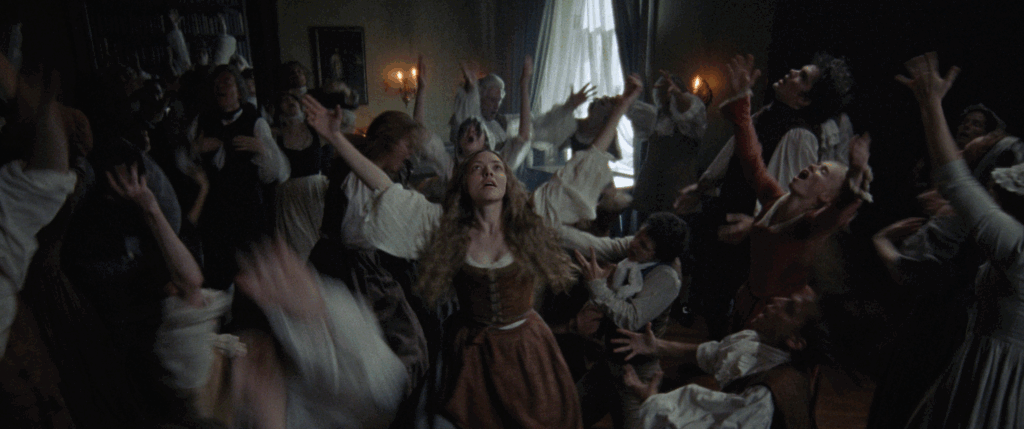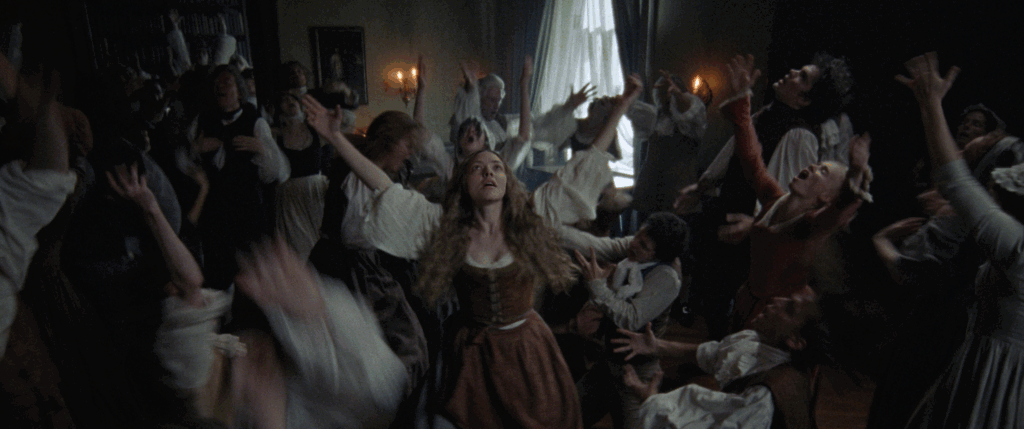Before watching The Testament of Ann Lee, I confess that my expectations were moderate and shaped purely by curiosity. My knowledge of the project didn’t go much beyond the fact that it was a historical musical starring Amanda Seyfried (Mamma Mia!), an actress I greatly admire and whose vocal abilities, already proven on the big screen, made me excited to see her in this genre. However, regarding the story of Ann Lee, the real religious figure the film is based on, I had zero frame of reference. In retrospect, I believe that having more prior knowledge would’ve helped me better calibrate my expectations for the movie’s unconventional approach.
The Testament of Ann Lee, directed by Mona Fastvold (The World to Come) and written by Fastvold and Brady Corbet (Vox Lux), is an epic fable that focuses on the life of Ann Lee (Seyfried), the founder of the ‘Shaker’ movement in the XVIII century, who was proclaimed by her followers as the Second Advent of Christ. The narrative traces Lee’s journey from her traumatic past in the United Kingdom to the establishment of a new community in the US, where faith is practiced through songs, ecstatic dances, and, crucially, a commitment to celibacy. The film essentially focuses on the unwavering conviction of a woman determined to lead a non-violent movement, dedicated to a purely spiritual form of love and a communal spirit that, Lee believed, would bring people closer to God.
The Testament of Ann Lee review

Regardless of the feelings The Testament of Ann Lee itself might evoke in the audience, one thing is undeniable: Seyfried is a force of nature. One of those performances that transcends the movie, existing in its own dimension of excellence. It’s an impeccable, powerful piece of acting that projects the figure of a woman with extremely strong religious convictions, who possesses unparalleled faith and feels a deep, direct connection with God. Her Ann Lee, from a simple follower to a leading, and finally, a divine figure, never bends.
She’s the pillar supporting a movement based on communal values and, ironically, the absence of sex, demanding members intensely confess their sins upon joining. Lee’s conviction regarding celibacy is cemented by a shocking personal tragedy, which led her to believe that fornication was the root of evil and divine punishment. Seyfried manages to convey this intensity and profound grief, transforming it into messianic fervor.
The actress’ vocal performance fits seamlessly into the hypnotizing score. This technical aspect is, without a doubt, the highlight of The Testament of Ann Lee. Composer Daniel Blumberg (The Brutalist) creates a somewhat eerie atmosphere characterized by a lot of thumping, clapping, and rhythmic sounds, which accompany the bizarre choreographies. These dances are described as a means of “releasing bad energies,” with frenetic arm movements that are certain to be etched into the memory of viewers.

Before ‘Mamma Mia!’, Amanda Seyfried Was One Step Away From Becoming TV Royalty
However, this technical passion isn’t always sustainable throughout the movie’s two-plus hours. Although the melodies and songs consistently managed to hold my attention, the cadence of the musical numbers sometimes becomes repetitive, slightly diluting the original impact of the initial sequences. William Rexer’s (The Brutalist) cinematography, while immersive during these dance scenes, sometimes fails by keeping certain moments too darkly lit, making visual perception difficult. Additionally, minor flaws in the sound mixing are noticeable, especially in transitions between the playing music and normal dialogue.
Regarding the narrative, The Testament of Ann Lee fulfills its mission as a kind of faith ‘biopic’. It explores the birth of a radical philosophy and its transport to a new world, where the ‘Shakers’ advocate equality and pacifism. Although Fastvold doesn’t shy away from including some shocking scenes — namely involving sex, traumatic childbirth, and violence suffered by the community (a reflection of the real persecution the Shakers faced) — I felt it lacked a bit more emotional ‘bite’ to elevate the story. The film consistently opts for serious drama, and any deviation from this, as it happens in one particularly misplaced comedic song, sounds strangely dissonant, negatively contrasting with the solemn tone of the piece.

Amanda Seyfried’s Gratitude for Tina Fey’s $130M Iconic Film Turned to Bitterness With a Price Tag
Is The Testament of Ann Lee worth watching?
The Testament of Ann Lee is a distinct, ambitiously formal historical vision by Mona Fastvold. It has its ups and downs, but it reaches ‘safe harbor’ thanks to the magnetic force and total commitment of Amanda Seyfried to the role of a figure of absolute conviction. Although the songs and production design create an often engaging audiovisual environment, the rhythmic repetition and lack of a stronger narrative “bite” prevent it from being the historical and musical epic it promised. It’s a peculiar experience that invites reflection, because even in its moments of imbalance, it reinforces the powerful truth that one person’s unwavering faith can, quite literally, shake the world.
The Testament of Ann Lee releases in selected theaters on December 25.





